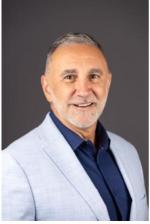
Entering the European LGBTQ+ tourism market
There are opportunities in the LGBTQ+ niche market for local operators who are inclusive and diverse throughout their operations. This travel group relies on specialist channels to research and book their experiences. This is because these specialists understand this group’s unique requirements. Safe travel destinations are limited; key ones include India, South Africa, Argentina and Brazil.
Contents of this page
- What requirements and certifications must LGBTQ+ tourism products meet to be allowed on the European market?
- Through which channels can you get LGBTQ+ travel products on the European market?
- What competition do you face on the European LGBTQ+ tourism market?
- What are the prices of LGBTQ+ travel products on the European market?
1. What requirements and certifications must LGBTQ+ tourism products meet to be allowed on the European market?
The European tour operator market must comply by law with several regulations to ensure its travelling clients are safe as well as financially protected. To do business with the European market you must align your business processes with theirs so you can meet their expectations. European tour operators will expect you to meet conditions they set in a Code of Conduct and/or Terms of Business.
Sustainability in all areas of tourism provision is essential for all European tourism suppliers. You must include sustainable actions across all your business activities.
What are the mandatory and additional requirements that buyers have?
The mandatory and additional requirements for LGBTQ+ tourism services are common across the sector. They include:
- The European Package Travel Directive
- General Data Protection Regulation (GDPR)
- Liability Insurance and Insolvency Protection
You can find out about them in the CBI study on the requirements for tourism services on the European market. The study will help you understand the legal, non-legal and common requirements European tour operators must comply with. If you understand the requirements they are bound by and can adapt your business to meet their needs, they are more likely to do business with you. It is important to European buyers that they can trust their suppliers to meet their and their customers’ needs.
What are the requirements for niche markets?
Sustainability, inclusivity, weddings and honeymoons, and the family market are key factors to consider when attracting the LGBTQ+ cohort. Catering to the large numbers of LGBTQ+ community members who attend Pride events is another factor to consider.
Become a sustainable business and prove it
Like most other key tourism segments, the LGBTQ+ market is aware of tourism’s environmental impacts and seeks sustainable and responsible products. They are likely to look for evidence of businesses’ sustainability practices through certifications or sustainability reporting. European outbound tour operators are also sustainably aware and look to connect with suppliers who share the same vision.
Becoming sustainability-certified is the best way to show your commitment. There are a few popular certification schemes for tour operators globally. Many destinations may also have developed and run their own scheme. International schemes include Travelife for Tour Operators, TourCert and Good Travel Seal.
If becoming certified is not possible right now, measurement and tracking can be a good place to start. Understanding your negative impacts is the only way you can start to make changes and improvements to your operations. For example, you cannot reduce your water consumption without knowing how much you are currently using.
An example is Eternal Landscapes in Mongolia, which has a very small team and operates a small number of trips yearly. They began their sustainability journey by tracking the carbon emissions of their internal operations and experiences. This allowed them to work on developing strategies on how to reduce their emissions and offset what is left. Have a look at the Best Practices for Successful Sustainable Tour Operators report for more examples.
Tips:
- Check whether your destination has its own certification scheme or recommends any. Explore it fully to see if it would be good to sign up, or if there are any government incentives or support to become certified.
- Join sustainable tourism associations that are available in country. Buyers like reassurance that their suppliers are well-connected and are working with others to support local sustainable development.
- For more information on how to change your practices, read the CBI studies on the tourism sector with guidance on being a sustainable business, going green and becoming socially responsible, and the regenerative tourism report.
Embed inclusivity and diversity throughout your organisation
LGBTQ+ demands for inclusivity and diversity are especially high. Being an LGBTQ+ traveller can be difficult, especially because of the number of destinations that have highly restrictive and even criminalising laws against the LGTBQ+ community. Tourism entrepreneurs need to check and know whether their destination is safe before offering this type of travel.
LGBTQ+ travellers prioritise suppliers who are genuinely committed to accommodating for their market and putting rights as a priority. There are many ways in which organisations can promote this – one is by displaying a colourful flag on their marketing channels, websites, and areas such as their front desk.
Getting your staff on board is an essential task. Some tips for you to do:
- It is important that you create an inclusive atmosphere within your own business as a precondition to attracting business from LGBTQ+ travellers.
- Put an internal inclusivity employment policy in place. Place an inclusivity and diversity code of conduct or statement on your website, like Pink Iceland’s policy page.
- Your team should be aware of the different pronouns used by LGBTQ+ travellers. All forms and other documents should allow guests to choose their pronouns and are not limited to only ‘male’ and ‘female’ options.
- Engage all team members (not just management) in training programmes like those of HospitableMe, WeTravel and All Stay.
You should also embed inclusivity and diversity within your marketing efforts. Make sure you clearly state to potential clients that they will be welcomed and respected and not be made to feel unsafe or be discriminated against. Include imagery and wording that promotes your openness to this market. This could include images of LGBTQ+ travellers on your website, in video promotions and in social media.
Figure 1: Marketing LGBTQ+ family travel
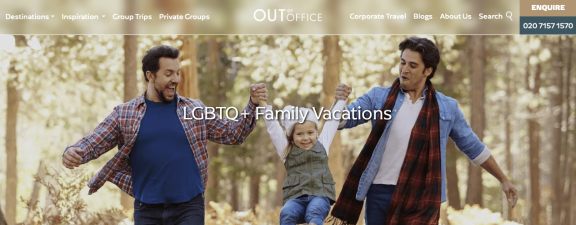
Source: Out of Office Travel, 2024
Tips:
- Check whether your destination is safe for LGBTQ+ travellers before promoting to that market. Use this interactive map to help identify the current situation.
- Find and work with LGBTQ+-friendly accommodation providers that are IGLTA-accredited. You can also use sites like Purple Roofs LGBTQ+ Travel Directory, TAG Approved hotels list and IGLTA members lists to find local LGBTQ+ friendly suppliers.
- Seek feedback and listen to you LGBTQ+ travellers. This will help you improve and learn from their experiences when in the destination and be ready to adapt your itineraries and suppliers if required.
- Encourage your local destinations management organisations to become certified with Queer Destinations.
Ensure the safety and privacy of your guests
Safety is an important concern for LGBTQ+ travellers, since many areas around the world remain unsafe for them. Most LGBTQ+ travellers will do careful research on local laws and customs of potential destinations, including the general attitude towards LGBTQ+ residents. To support this, make sure to keep track of local laws and regulations and provide your guests with all the information they may require for staying safe. Research locally owned and friendly LGBTQ+ businesses and include these in the itineraries.
Speaking to local members of the LGBTQ+ community can help build awareness around issues and provide recommendations of safe neighbourhoods and businesses. Providing guests with all the information about the local customs and laws and how they may need to act in the destination can help ease any concerns both before and during their trips.
Figure 2: Safety advice on South Africa for LGBTQ+
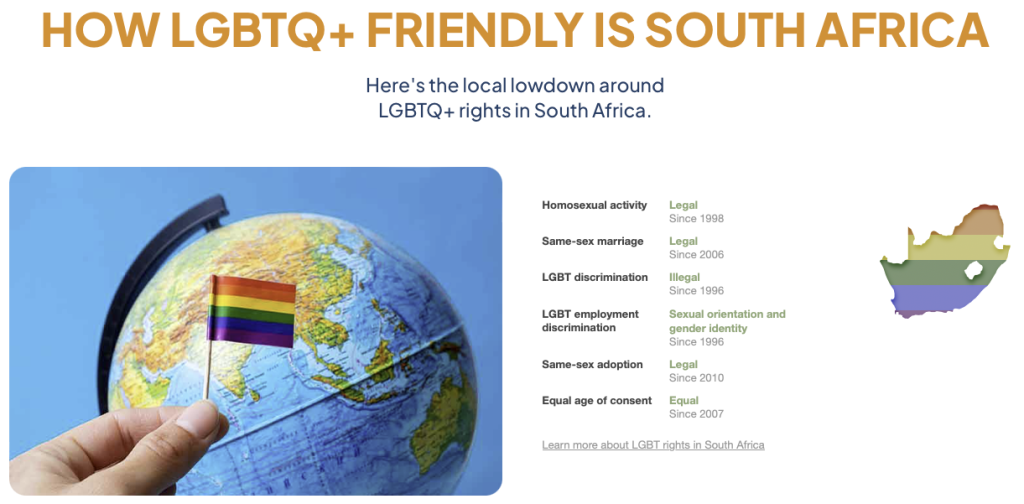
Source: Destination Rainbow, 2024
Due to these safety concerns in some destinations, LGBTQ+ travellers sometimes rather stay in more private locations. B&Bs and private housing can be a preference, alongside smaller more intimate hotels. Additionally, they may prefer to be on private, tailormade tours rather than in large groups.
Figure 3: Expect a warm welcome – inclusive tour operator marketing
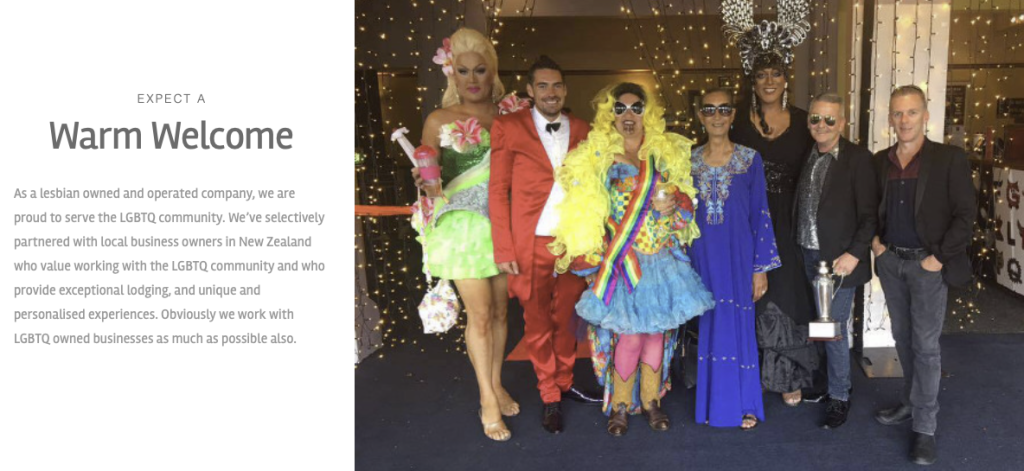
Source: New Zealand Awaits, 2024
Tips:
- Ask guests before they travel about their concerns and preferences. This will ensure you can accommodate them and avoid situations that make them feel uncomfortable.
- Provide up-to-date, destination-specific information sheets with safety tips and LGBTQ+-friendly neighbourhoods and businesses. You can refer to the WYSE Travel Confederation – Travel Safety for LGBTQ+ Travellers for support when developing your destination guidelines for your guests, or even provide them with the link for advice.
- Refer to the IGLTA safety guide for more information on safety and security.
Keep up to date with local LGBTQ+ events
The growing number of Pride events around the world reflect the increasing acceptance of the LGBTQ+ community. Visiting such events is a big motivator for the LGBTQ+ community. The events help LGBTQ+ travellers embrace local cultures and connect with local LGBTQ+ community members.
Looking out for and being aware of such events is important when trying to attract this market. Travellers may include a visit to these events as part of a wider itinerary. Pride events significantly increase the numbers of LGBTQ+ travellers within the destination, so enhancing your marketing efforts and presence around these periods can help boost sales.
Figure 4: Taking part in Pride events is very popular in the LGBTQ+ community
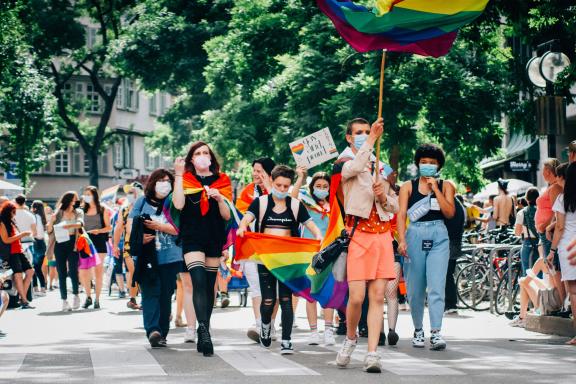
Source: Christian Lue, Unsplash, 2024
In 2023, it was estimated that 102 countries held Pride events around the world. Some destinations have these events as part of their annual calendar. Others, like Guyana, Angola, Botswana and Saint Lucia, hosted one-off events within the last three years. More information about the Pride events calendar can be found on the Travel Gay and IGLTA websites.
Tips:
- Build partnerships with local LGBTQ+ community members to keep abreast of the local events calendar.
- If Pride events are not currently present in your destination and there is a vibrant LGBTQ+ community, work with local LGBTQ+ groups, tourism boards, associations and councils to encourage the development of such events.
Make your business honeymoon- and wedding-ready
Same-sex marriages are now legal in most European countries. Where they are not, a civil partnership ceremony might be the only option for gay couples. As more European countries legalise gay marriage, there is likely to be a steady increase in demand for destination weddings and honeymoons.
In developing countries, legalities on gay marriage may differ depending on the country and where tourists are from. It can be a confusing task, but you must know whether marriages in your destination will be legally binding in the couple’s home country. For example, at present LGBTQ+ couples from most of Europe can be legally married in the countries listed below.
Figure 5: Developing countries where gay marriage is legal for most Europeans
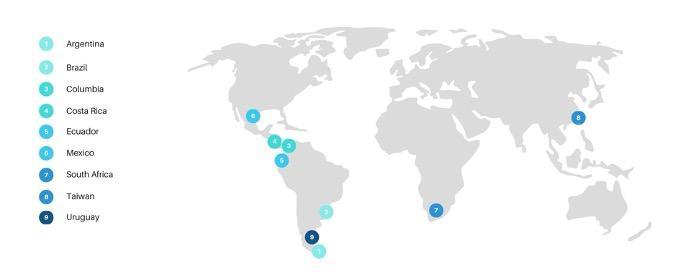
Source: Acorn Tourism Consulting, 2024
If your country does not even offer legal civil partnerships, explore whether you can offer symbolic or commitment ceremonies. Although these might not be legally binding, they give you the opportunity to reach out to the LGBTQ+ community with a special ceremony for them and their friends and families.
LGBTQ+ couples like to find exceptional places to get married as they often have greater disposable incomes than opposite-sex couples, and religious venues are less popular amongst the LGBTQ+ community. Like any other wedding ceremony, beaches are common locations for weddings, as are wineries and distilleries, luxury resorts or hotels, city parks, and other iconic or well-known indoor or outdoor locations.
Out of Office, a specialist travel agent for the LGBTQ+ community, has listed the top destinations for gay weddings: South Africa, Mexico and French Polynesia.
After the wedding, much like any other newlyweds, LGBTQ+ couples like to honeymoon or go on holiday straight away, which offers opportunities for local operators to provide these services as well.
Tips:
- Familiarise yourself with the marriage requirements for foreign couples in your country and see if there are any special services offered for the LGBTQ+ community.
- Ensure your wedding or honeymoon department and suppliers can offer the appropriate expertise and support to LGBTQ+ couples too. This includes planning, helping secure the appropriate licences, booking an officiator and organising the catering. Make sure the places you offer for weddings are duly licensed.
- Establish strong working relationships with other service providers, including florists, photographers, entertainers and musicians.
- Put together a series of wedding packages with a range of options. This will help those travelling on a budget.
- For more information, review the IGLTA same-sex marriage guide.
Build itineraries and experiences that are family-friendly
More gay marriages mean there is a growing demand from LGBTQ+ families to travel with their children. However, these families often find it difficult to find suitable destinations where they will not face hostility from providers unused to same-sex couples with children. For these reasons, LBGTQ+ parents often prefer to travel where they will feel safe, respected and welcome.
Like other family travel groups, LGBTQ+ parents are concerned about the availability of family-friendly activities and facilities. To reassure them, make sure your offering includes suitable activities for parents and children while also indicating that your business is LGBTQ+-friendly. For tips on providing family-friendly activities, see the CBI report Entering the European multigenerational travel market.
Figure 6: Insight on attracting LGBTQ+ families
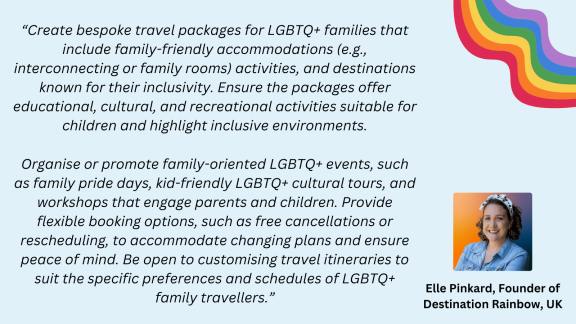
Source: Acorn Tourism, 2024
Tips:
- Be very clear on your website and in any marketing materials that you welcome LGBTQ+ families. This could be through your website’s written content or by including LGBTQ+ families in your marketing images.
- Make sure all families, whether they include LGBTQ+ individuals or not, enjoy the same benefits, courtesy and service from all your staff and providers.
2. Through which channels can you get LGBTQ+ travel products on the European market?
The LGBTQ+ market is quite diverse. Specialist tour operators and online travel agencies (OTAs) are the most important sales channels for LGBTQ+ travel products. They know their market very well and are knowledgeable about destinations and services they can offer. Becoming a trusted supplier for a tour operator or specialist OTA is the best way to enter this market.
How is the end market segmented?
The LGBTQ+ segment is comprised of several cohorts, broadly identified as:
- Lesbian: Lesbian travellers often identify as women first.
- Gay: Male gay travellers often prefer to visit urban destinations that are gay-friendly.
- Transgender: Individuals who have changed their sexual identity.
- Bisexual: Bisexuals relate to both men and women and do not want to be labelled as gay or straight.
- Queer or questioning: This segment includes many other smaller niche segments such as intersex and pansexual.
- +: All other identities that associate with the community.
- LGBTQ+ families: This segment includes parents of children who have been adopted, are from previous relationships or were fostered, or were born from donor insemination and surrogacy.
For more information on the segmentation of the market, refer to The European market potential for LGBTQ tourism report.
Through which channels does a product reach the end market?
Specialist LGBTQ+ tour operators and OTAs are the main sales channels for LGBTQ+ travel products. Many general tour operators also offer LGBTQ+ trips and holidays. Direct sales channels like your website and social media are also important. The process is outlined in the chart below.
Before booking, this market will do lots of background research. Alongside social media platforms like Instagram, Tik Tok and Facebook, the LGBTQ+ community relies heavily on recommendations from influencers who might be popular on social media or have their own travel blogs. Some travel influencers and bloggers are The Globetrotter Guys, and LesBeMums. Refer to the World Mappers website for a list of the best LGBTQ+ travel bloggers.
Figure 7: Sales Channels for LGBTQ+ Travel Products
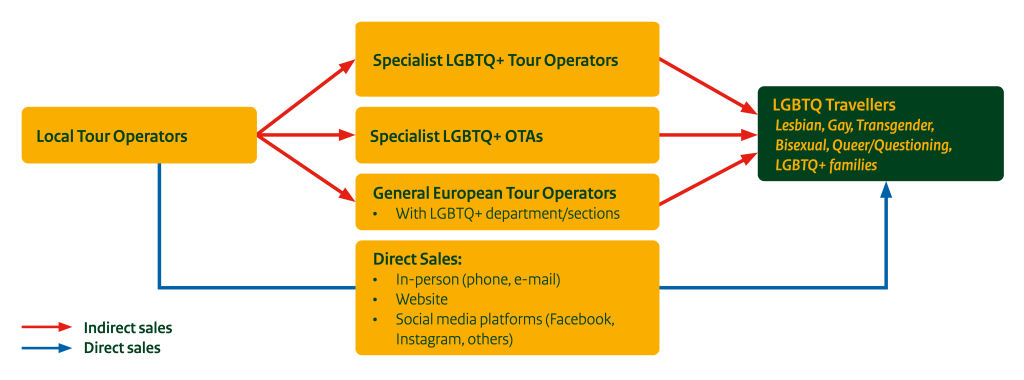
Source: Acorn Tourism Consulting, 2024
Each channel is outlined as follows:
- Specialist LGBTQ+ tour operators: tour operators in Europe that specialise in the LGBTQ+ travel market are growing in numbers. Operators from leading outbound markets include Pink Tours, Over the Rainbow and Voyemo (Germany); Out of Office, Pride Expeditions and Destination Rainbow (UK); LGBTVOYAGES and Gay Sejour (France); GaySail (Netherlands); Seven Colors Tours and Leemba Travel (Spain).
- Specialist LGBTQ+ OTAs: Accommodation OTAs that cater specifically to the LGBTQ+ market include Mister B&B, Purple Roofs, World Rainbow Hotels and ebab.com. There are fewer tour operators and experienced OTAs that cater specifically to this market. Travel Gay is one LGBTQ+-specific OTA. Contiki, The Adventure People and Tourradar feature LGBTQ+ options.
- General European Tour Operators and OTAs: There are several European travel agents and tour operators entering the LGBTQ+ market. They are doing this by employing members of the LGBTQ+ community and promoting this expertise on their website – for example DERTOUR (Germany), Kuoni, Scott Dunn and Hays Travel (UK), and La Perle Noire (France).
OTA platforms like Booking.com, Preferred Hotels and Expedia have sections that promote options for this market through special sections or search filters.
- Direct sales: This segment often books directly with local activity providers. Therefore, having your own well-designed and functioning website is very important. This group is likely to return to the same provider and recommend options to friends and family. Being proactive with post-travel marketing and communicating with past clients can support this.
Other ways to reach the LGBTQ+ market
Having a presence in the B2B (business to business) market will also help your sales efforts. Joining a specialist association or organisation, and/or attending trade fairs are good ways to build your profile. LGBTQ+ associations and non-profits often act as research and search engines for travellers looking for LGBTQ+-friendly suppliers.
IGLTA (The International LGBTQ+ Travel Association) is used widely by LGBTQ+ travellers to find destinations, operators and businesses that cater to their travel needs. The resources are extensive and range from large corporations to local businesses. The Plan Your Trip tool allows searches by location, provider category and trip type.
Many LGBTQ+ specialist tour operators will have an IGLTA membership to reach their target market more effectively. As a member, you can feature their logo on your website. Accommodation providers can go the extra step by becoming IGLTA-accredited, providing evidence of their commitment to the LGBTQ+ community.
Figure 8: How IGLTA is featured on a tour operator website

Source: Contes Asia, 2024
ITB Berlin, the world’s largest travel show, has a dedicated LGBTQ+ exhibition area, including a presentation corner, networking events, lectures, and online and on-site seminars. By attending such events you can broaden your own knowledge about the market.
Tips:
- Research European tour operators that specialise in selling LGBTQ+ trips to developing countries and learn from them as you develop your own tours.
- Stay on top of developments in the LGBTQ+ travel market. In addition to IGLTA, consider joining one of the many other membership associations: ILGA (International Lesbian, Gay, Bisexual, Trans and Intersex Association), ILGA-Europe and GETA(Gay European Tourism Association). Equaldex compiles information about LGBTQ+ rights by country.
What is the most interesting channel for you?
The most interesting channels are the specialist LGBTQ+ tour operators and OTAs, and outbound tour operators with an LGBTQ+ department. Being such a specialist niche market, travellers are likely to use these platforms and businesses to research and book their tours and holidays.
Research the specialist LGBTQ+ tour operators and OTAs that work in the outbound markets you focus on. Before reaching out to them or listing your products, make sure you have an up-to-date website with all the information about your offering.
Additionally, as a local operator in a developing country, being associated with trusted and high-profile organisations is a good way to reach the European LGBTQ+ consumer. IGLTA membership will also give you global reach. However, to enhance your status with LGBTQ+ travellers your website should also provide comprehensive information about the travel services you offer.
Tips:
- Contact your local DMO (destination marketing organisation) and/or national tourist board for help with promoting the services you offer to LGBTQ+ visitors. See if you can place your link on their website.
- Ensure that your independent marketing efforts are current and active. These channels include email communication, social media platforms, travel review sites (such as Tripadvisor) and destination management organisation websites.
- Read the study How to be a successful tourism business online?[TC-VU1] to help build or update your website.
3. What competition do you face on the European LGBTQ+ tourism market?
Most of the best-known and most-visited destinations by the LGBTQ+ community are in Europe and North America, where inclusion and respect have improved in the past few decades. European LGBTQ+ travellers are more likely to choose a destination where they know they will feel safe and respected without fearing discrimination.
However, recently developing countries are becoming more popular with LGBTQ+ travellers as they become more welcoming, with changing views and laws. Latin America is the top continent for safe LGBTQ+ travel, with many countries being top-of-the-list for this market.
This ILGA map shows the difference in legal protections or punishment for same-sex couples. Amongst developing countries, many African countries and Middle Eastern countries have some of the harshest laws, while some countries in South America provide high levels of legal protection from discrimination.
Figure 9: Sexual orientation laws in the world
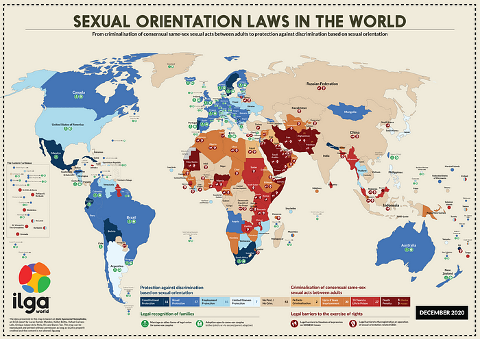
Source: ILGA, 2020
Which countries are you competing with?
South Africa, Argentina, India and Brazil are amongst the top and safest destinations for LGBTQ+ travellers. Other competing destinations are Uruguay, Ecuador, Peru, Mexico, Thailand and Chile.
Major cities in all these destinations are generally welcoming of LGBTQ+ visitors and host large events aimed at LGBTQ+. Pride events are showcase festivals in cities, and many European LGBTQ travellers plan long-haul trips so they can attend such events. However, rural places in these countries can be more challenging for LGBTQ+ travellers.
Brazil
Brazil is home to two of the top gay-friendly cities anywhere, Sao Paulo and Rio de Janeiro. Rio’s Carnival is one of the most famous festivals in the world and it is a welcoming destination for LGBTQ+ travellers. Gay rights in Brazil are amongst the most liberal in the world. Same-sex marriage and adoption were legalised in 2013, and discrimination based on sexual orientation and gender has been considered a crime since 2019.
Travel in the main cities and tourist areas is safe owing to laws and regulations. However, there are still some strong negative views about the LGBTQ+ community, particularly in rural areas. Unfortunately, this has resulted in Brazil having one of the highest crime rates towards this group. Safety and awareness are therefore important when travelling off the beaten track.
Key cities include Salvador, Rio de Janeiro and Sao Paulo, with thriving queer scenes and many queer-friendly areas, bars and nightclubs. The famous beaches also feature Pride flags, showing their openness for this travel group.
Figure 10: A thriving gay scene at the Rio Carnival
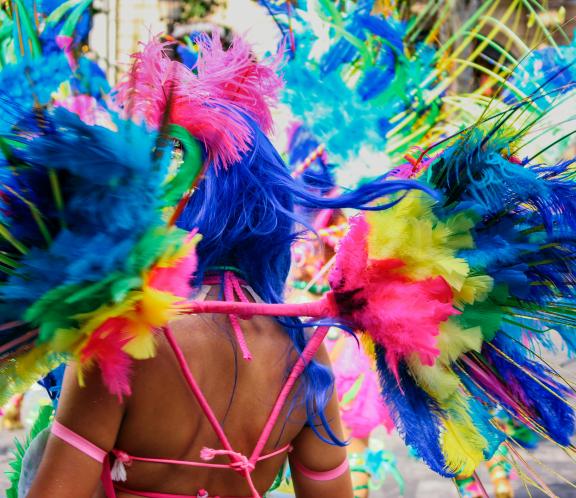
Source: Venus Major, Unsplash, 2024
Argentina
Argentina is a progressive country when it comes to LGBTQ+ rights, making it a safe and attractive destination for this travel cohort. It was the first country in Latin America to legalise same-sex marriage and the second on the American continent after Canada. It is one of a few countries that allows gay marriage between non-residents.
The legalisation of gay marriage in 2010 made Argentina one of the leading places for destination weddings. LGBTQ+ tourists choose this destination, as it offers fast-track same-sex marriage ceremonies that allow international visitors to get married in under five days. Argentina also became the world’s most transgender-friendly country when it introduced gender identity laws in 2012.
The government proactively supports gay events, such as the Gnetwork 360 Conference every August and the BA Pride in November, a highly acclaimed event in Latin America. The gay scenes in Buenos Aires, Mendoza and Cordoba are vibrant, and the city of Rosario has a reputation for being the most gay-friendly and liberal-minded in Argentina. There are dedicated websites for LGBTQ+ travel in some of the leading cities, like Visit Buenos Aires LGBT.
India
Gay sex was decriminalised in 2018 in India, and transgender rights have also improved in recent years. Although conservative and lacking legal LGBTQ+ protections, India’s reputation as a gay-friendly destination is growing, and all mainstream destinations typically welcome LGBTQ+ visitors.
Major events include the Queer Azaadi Mumbai and the annual International Queer Film Festival in Mumbai. There is a vibrant gay culture in most large Indian cities, including several Pride events in Chennai, Delhi, Bangalore and Kolkata. In addition to the major hotel chains, which are typically welcoming to LGBTQ+ visitors, small boutique and local hotels in India are also actively targeting LGBTQ+ travellers.
South Africa
South Africa is the safest destination for LGBTQ+ travellers in Africa, and a leading example of positive progression for this group. It offers significant protection for LGBTQ+ people, along with progressive transgender laws. Same-sex marriage was legalised in 2006. In addition, same-sex couples are legally allowed to adopt, and the right to legally change gender was granted in 2003.
Large Pride events are held every year in Cape Town and Johannesburg. These events are known as the Pride of Africa and are the largest on the continent. They attract large numbers of inbound tourists from around the globe. Outside of the major cities, particularly in rural areas, views and safety around LGBTQ+ people may vary. LGBTQ+ travellers are advised to stay in touristy areas and, if they do venture to the countryside, to travel as part of a tour or with a specialist guide.
Outside of targeted LGBTQ+ events, South Africa’s tourism product is exceptional and local operators have an opportunity to expand their range to attract more LGBTQ+ travellers. The national tourism board of South Africa has run campaigns centred around attracting the LGBTQ+ community. This includes publications such as Exploring the Rainbow Nation: South Africa.
Key Takeaways:
- The LGBTQ+ market needs to feel safe and secure when travelling. Therefore, make sure you are aware of all their rights and laws in your destination.
- Find out if there are any Pride events or LGBTQ+-focussed experiences that you can incorporate into your tours.
- Work with your local and national tourism boards to promote inclusivity and diversity.
- Encourage local Pride events to be developed in your area and for the tourism board and other key players in tourism to promote them internationally.
Which companies are you competing with?
Local tour operators working in the LGBTQ+ sector include specialist organisations that only supply the LGBTQ+ market and companies that promote themselves as LGBTQ+-friendly. This section profiles a selection of both.
Brazil
Discover Brazil is a locally owned inbound tour operator that caters to a variety of customer groups and interests. Amongst their offerings are LGBTQ+-focussed group tours and holiday packages. They have built more than six tours focussed on this market. Two of their tours include Pride events and carnivals, and visits to world-famous LGBTQ+-friendly bars and clubs in key tourist sites.
Brazil Ecojourneys is an LGBTQ+-owned company that caters to all traveller groups. They have a strong focus on sustainable and responsible tourism, and work with locally owned accommodation providers and suppliers that have gained sustainability certification. While they cater to all traveller types, being LGBTQ+-owned they understand the needs and concerns that come with travelling as a member of this community. They provide expert advice and support to LGBTQ+ travellers throughout the booking process and during their trip.
The LGBTQ+ surf camp was launched in 2013 and runs every year, building a community of gay surfers and helping combat homophobia in surfing.
Argentina
BA Gay Travel is a gay-owned travel agency that offers a wide selection of packages to Buenos Aires and other South American destinations. They focus solely on the LGBTQ+ travel community. Their packages include New Year celebrations in Buenos Aires, wedding packages, the Rio Carnival, Gay Argentina, and Patagonia and its glaciers.
The website also features a Buenos Aires Gay Guide that focusses on finding the best LGBTQ+ experiences. They also feature travel tips for couples looking into getting married in Argentina.
Figure 11: Gay guide to Buenos Aires
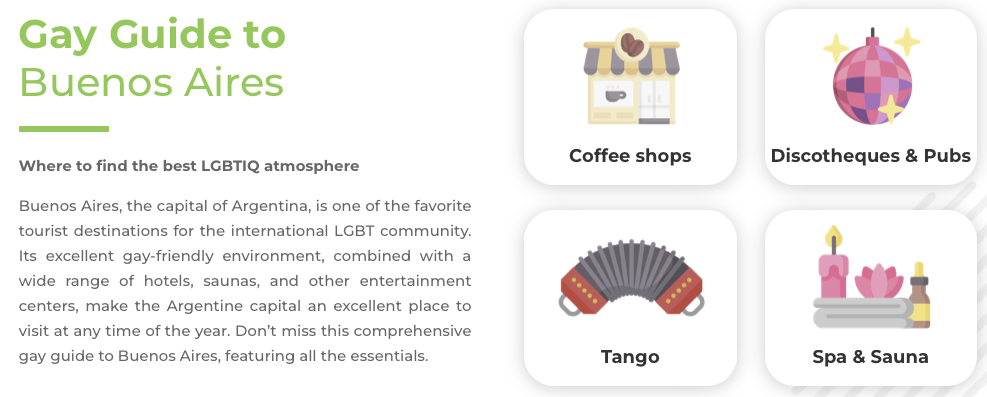
Source: BA Gay Travel, 2024
Lunfarda Travel is a small experience provider based in Buenos Aires. They focus on specialised tours that show the best of the city, including tours exploring Argentina’s LGBTQ+ history. Ten percent of their profits from these tours go to Mocha Celis, a school catering to trans and gender non-conforming people.
The operator is a member of IGLTA, showing their commitment to the safety and security of this community. They are also a member of a locally run programme, the TODXS BIENVENIDXS Argentina LGBTQ, an initiative that supports tourism enterprises to welcome the LGBTQ+ community and make them feel safe and included.
Fabulous Weddings, founded in 2010, plans weddings for foreign LGBTQ+ couples. This was the first company in Argentina to organise same-sex weddings. They offer various services, including dealing with all the legalities. Their inspirational website has many testimonials from couples and links to news articles.
India
Indjapink is India’s first tour operator targeting gay men only, providing customised luxury travel to destinations all over India. Tours are provided by local gay English-speaking guides, which helps the guests feel safe and secure. Being focused solely on this market, they have carefully selected gay-friendly suppliers. They offer both private and group tours, honeymoon products, and experiences for senior LGBTQ+ travellers and LGBTQ+ visitors with disabilities.
Indi Driver is an inbound Indian tour operator that serves many niche markets, including LGBTQ+. They focus on tailor-made and package tours for tourists of all ages and group sizes. Unlike some of the other LGBTQ+ tour operators, they also cater to the transgender community alongside gay and lesbian groups. There is a dedicated section on their website highlighting the options for this travel audience.
They have also created an in-depth Q&A page that discusses travelling in India as an LGBTQ+ visitor, looking at safety issues, and much more.
Figure 12: Targeting trips and tours to specific LGBTQ+ groups
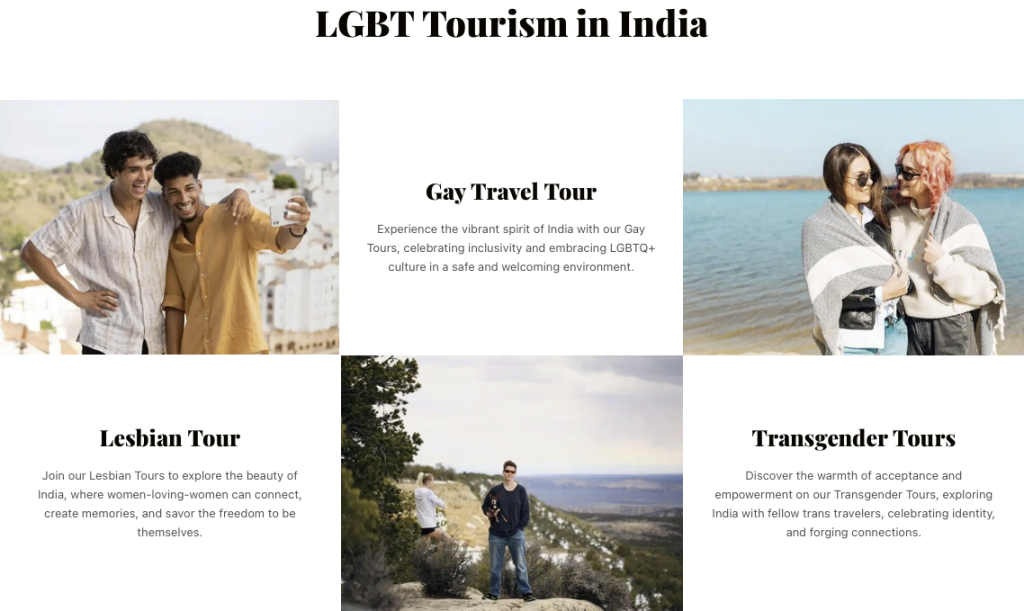
Source: Indi Driver, 2024
Gay Tours India is LGBTQ+ owned and managed. The business understands that LGBTQ+ travellers have specific needs and require different support than other niche markets. They are aware that LGBTQ+ travellers may have different interests and do not just focus on visiting key historical sites. They also focus their experiences on learning about local LGBTQ+ history and visiting LGBTQ+-friendly businesses.
All staff are part of the LGBTQ+ community and have visited all the places on their tours. This provides extra reassurance to their clients that they will feel welcomed and safe.
South Africa
LGBTQ Vacation is a division of Amatungulu Tours operating tours from Cape Town and Johannesburg. Their tours include safaris and game drives, trips to Table Mountain, adventure activities like bungee jumping, visits to wineries and marine life watching. They use either gay-owned or gay-friendly accommodations. Where possible, tours incorporate local gay events during the day or evening, like the Pink Loerie Festival in Knysna, a local Mardi Gras and arts festival.
Gay Weddings Abroad is a supplier for destination weddings in South Africa. They have an expert team and work with the best LGBTQ+-friendly suppliers in the country. They know that same-sex marriage requires lots of paperwork, and are there to help with all of it.
Their website provides generous information about the different steps that need to be taken before getting married. They have an in-depth Q&A section and are happy to speak on the phone or via email to answer any questions clients may have.
Key Takeaways:
- Understand what makes your destination a great LGBTQ+ place to visit and make sure your travel product reflects this.
- Research what your competitors are doing, both in the LGBTQ+ market and in other sectors. Use the knowledge you build to adapt strategies that might also work in your sector.
- Take time to establish a USP (unique selling point), which is what makes your product different from others’. See CBI’s tips for doing business with European Buyers to learn more about creating a USP for your product.
- Provide authentic travel products. Working closely with the local LGBTQ+ community to develop and provide a travel product is a crucial way to provide authenticity and evidence inclusion and diversity.
- Think carefully about how you can provide your LGBTQ+ guests with key services that you would also provide to any other guests. This includes bed assignments as requested, welcome amenities such as bathrobes and slippers, and offering spa packages.
- Work closely with other LGBTQ+ stakeholders in your area, for instance the organisers of a Pride celebration and other LGBTQ+ events. Establishing partnerships will help increase your visibility in the market.
- Support local LGBTQ+ NGOs and organisations.
Which products are you competing with?
There are no competing products. LGBTQ+ is a specialised market that defines people according to their sexual orientation and gender identity rather than specific products.
You should undertake some competitive research of businesses like those profiled in the above section. Assess what products they offer and compare them to yours. Ask yourself what you could do differently and/or better than the competition. See if you can spot a gap in the market in your region.
4. What are the prices of LGBTQ+ travel products on the European market?
Prices of LGBTQ+ experiences, trips and holidays vary, as in many other segments. They depend on multiple factors, such as service level (budget or luxury), inclusions (transportation, admission fees, tour guides), food and drinks, type of accommodation, and the destination itself. The chart below displays examples of prices in the market.
Table 1: Sample prices of LGBTQ+ travel products on the European market, 2024
| Tour | Country | Duration | Price pp from € |
| Private LGBT Cusco City Tour | Peru | 1 hours | 24 |
| Rainbow Downtown – walking tour | Mexico | 4 hours | 46 |
| Shared Queer BA: The history of the Argentine sexual diversity and community | Argentina | 4 hours | 53 |
| Discover the best of Montevideo | Uruguay | 3.5 hours | 61 |
| Horseback Riding | Costa Rica | 3 hours | 70 |
| Gay Private Explorer – an insight tour to gay nightlife in Bangkok | Thailand | 4 hours | 75 |
| Gay Side of History – great Aztec temple to Spanish inquisition | Mexico | 3.5 hours | 84 |
| Kayaking with Penguins | South Africa | 2 hours | 95 |
| Private tour: Medellín's Flower Culture & The Silletero Tradition of Santa Elena | Colombia | 4 hours | 98 |
| The Big Mango Adventure (private) | Thailand | 6 hours | 109 |
| Christ Redeemer and Santa Teresa Artistry | Brazil | 7 hours | 127 |
| LGBT-Friendly Delhi Agra Jaipur Tour | India | 4 days | 372 |
| Gay Surf Camp | Brazil | 7 nights | 1,406 |
| Colombia Gay Tour | Colombia | 8 nights | 5,150 |
Source: Acorn Tourism Consulting, 2024
Tip:
- Set prices for your tours carefully. Know exactly what the costs are, to make sure they will be profitable. These guides can help you: CBI’s 10 tips for doing business with European tourism buyers and Orioly’s 5 Things to Consider When Costing and Pricing a Tour.
Acorn Tourism Consulting Limited carried out this study on behalf of CBI.
Please review our market information disclaimer.
Search
Enter search terms to find market research
